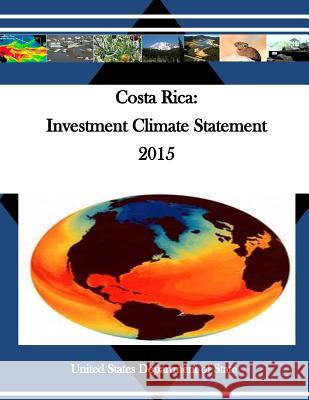Costa Rica: Investment Climate Statement 2015 » książka
Costa Rica: Investment Climate Statement 2015
ISBN-13: 9781530700196 / Angielski / Miękka / 2016 / 26 str.
Costa Rica is located in Central America. Costa Rica's investment climate has been for many years generally favorable. Consequently, foreign direct investment is high and has been a significant contributor to Costa Rica's economic growth. The country's legal and cultural environment continues to present stumbling blocks to investors. Nevertheless, challenges to the country's competitiveness, including rising operating costs, a complicated legal environment, excessive bureaucratic red tape, and infrastructure deficiencies, are fueling caution on the part of investors. Costa Rica's continued popularity as an investment destination is well illustrated by historic FDI which climbed steadily from the year 2000 (USD 409 million) to 2008 (over USD 2 billion), and reaching a high of over USD 2.6 billion (5.4 percent of GDP) in 2013 before dropping back to USD 2.1 billion in recently released figures for 2014. In recent decades the Costa Rican government has focused on attracting relatively high-tech manufacturers and service companies that demand skilled labor, introduce new technologies and often run robust Corporate Social Responsibility (CSR) programs. The vast majority of these companies establish themselves in Free Trade Zones that enjoy certain fiscal benefits. Consistent with this orientation, the Costa Rican government was aggressive in signing free-trade agreements, tax information agreements and generally participating in the global arena under former President Laura Chinchilla. The current Solis administration, which took office on May 8, 2014, has been aggressive in seeking FDI inflows and has prioritized foreign visits to potential investors in Asia, Europe and the Americas. Despite years of trade liberalization, the Costa Rican economy is not as advanced as this export-led development might suggest. The legal system, while solid and generally uncorrupt, can be very slow and often disappointing. Invasion and occupation of private property by squatters, who are often organized and sometimes violent, does occur in Costa Rica. The Costa Rican police and judicial system have at times failed to deter or to peacefully resolve such invasions. Much of Costa Rica's basic infrastructure - ports, roads, water systems - needs major upgrading. In a significant step forward for port infrastructure, Dutch-based APM Terminals broke ground in early 2015 on its long-delayed USD 1 Billion megaport on the Caribbean coast. Private-public partnerships as well as concessions continue to face numerous legal and procedural challenges that have delayed, or in some cases, canceled key infrastructure projects. Even China, which has sought to invest in two major infrastructure upgrades, has seen these projects stalled by bureaucratic and legal concerns.
Zawartość książki może nie spełniać oczekiwań – reklamacje nie obejmują treści, która mogła nie być redakcyjnie ani merytorycznie opracowana.











